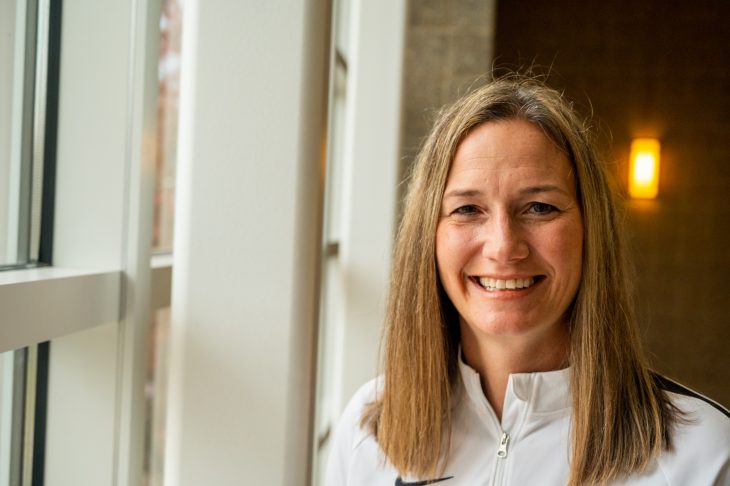
Juli Fulks’ undergraduate experience positioned her perfectly to support first-generation players in her current role as the Pioneers head women’s basketball coach. She is familiar with the utter lack of familiarity facing first-generation students; after all, she was one herself. Originally from Dunkirk, Ohio, Fulks grew up as the second child of a truck driver and a stay-at-home mom in a small, rural community.
Despite not attending college themselves, her parents emphasized education and valued it so highly that Fulks never questioned if she would earn her degree.
“Mom and Dad were always willing to be supportive,” Fulks said. She found school enjoyable and engaging, and remembers spending summer vacations going to the library and reading before moving to Columbus to attend Capital University.
Playing college basketball and volleyball, Fulks relied on her upperclass teammates to help her learn the higher ed ropes, all while feeling a constant internal pressure to meet the myriad unwritten expectations of college life.
“All of my friends in high school were a year older than me,” Fulks said. “I got to watch what they did and see how they were being successful.”
Conversations with friends and their families helped Fulks navigate an unfamiliar environment and led her to opportunities she might have otherwise missed, including internships with her local health department and a sleep lab, which she eventually managed post-graduation before transitioning to coaching.
This didn’t prevent a few initial stumbles, namely when Fulks registered for a major-level biology class alongside calculus and chemistry in her first semester, inadvertently signing up for an extremely rigorous academic load.
“I actually dropped Calc my freshman year because I had a B and I didn’t have anyone to tell me that it was a terrible idea to drop that class,” she reflected. “Parents who had gone to college would say ‘Hey, that’s okay; we’re not dropping this because of a B,’ but I was on my own and thought I had to have an A in everything.”
Determined to be self-reliant and unsure of who to ask for assistance, Fulks remembers flipping through her university’s course catalog to make sure that she was taking the right classes for her major.
“I didn’t know who to ask, so I just tried to figure out what to do on my own,” she recalled. Experiences like this one taught her the value of asking others for help. “I was embarrassed and I made it a lot harder because I just didn’t ask.”
Today, Fulks regularly reminds her first-generation players to reach out and ask for help from the resources Transylvania has in place to support them, including herself.
“There’s lots of variety in terms of first-generation students,” she said. “They might figure it out on their own, or they might get overwhelmed and collapse.”
Fulks’ own student experiences make her an effective recruiter of first-generation players, as she can relate to the parents as well as the students. “I know what those parents are going through when they don’t know what to ask, and what the students go through when they get here and everything is overwhelming,” she said.
Fulks ultimately graduated from Capital University in 2000 with a major in biology and a minor in psychology — the first in her family to earn a bachelor’s degree. She has since gone on to earn her Master of Arts in education from Defiance College and her doctorate in leadership studies from the University of the Cumberlands.
A college degree “opens up doors that you can’t have otherwise, regardless of what career you go into,” Fulks said. “By the end [of college], I knew that being a science major was hard, and I could do something that was hard and unique and different, and do well at it. That boosted my confidence that I could go on and do the things that I wanted to do. Each [degree] gives you confidence that ‘I can do all of this.’”
Today, Fulks and her three siblings all hold degrees. “Educating first-generation students changes families,” she remarked, noting that she was able to draw on her own experiences to help her younger brothers when they decided to pursue their own degrees. She continues to feel a strong sense of gratitude to her parents for their support and the emphasis they placed on education.
“My parents were unbelievably supportive,” she said. “We grew up reading, and I know how much easier that made my life.”
Transylvania University is committed to the success of its first-generation students. The university has planned a first-generation student celebration week Nov. 7-11 and will be holding a wide variety of events to honor this population.

